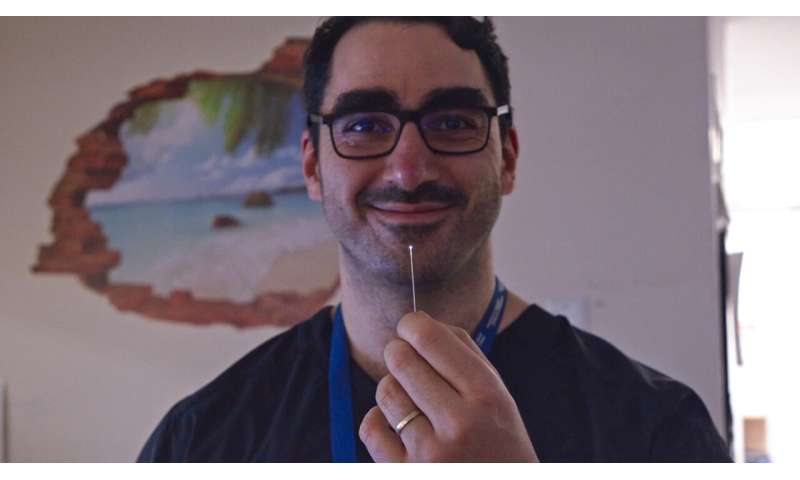A world first: Tiny camera captures color video from inside the brain

Physicians tasked with diagnosing stroke patients have a new tool in their arsenal thanks to an innovative treatment devised by Vena Medical, a company spun out of Velocity, the University of Waterloo's start-up incubator.
Using a tiny camera invented by Vena Medical that provides physicians with a real-time, full color view of inside the brain's blood vessels, doctors at The Ottawa Hospital were able to diagnose and treat a patient who was suffering from multiple strokes, a world's first. The doctors were able to use Vena's MicroAngioscope to not only pinpoint the cause of the stroke attack but also treat the patient in just one hour.
"What our camera does is allow doctors to see exactly what's going on inside a blood vessel, providing information they've never had before," said Michael Phillips (BASc ), CEO and co-founder of Vena Medical.
He said doctors are unable to determine the cause of a stroke for about one-third of patients who experience multiple strokes. Physicians prefer to use X-ray technology to diagnose, navigate and treat patients who suffer from a stroke.
"Using an X-ray is like using GPS only to navigate, but having a camera is like seeing through a window," Phillips said.
Developed out of Phillips' and co-founder Phillip Cooper's (BASc) fourth-year mechanical engineering design project, the camera is one-third of a millimeter in diameter.
Dr. Robert Fahed, interventional neuroradiologist at The Ottawa Hospital is the first physician to perform this procedure using Vena's MicroAngioscope.
"This opens the door to a new way of practicing this specialty," Dr. Fahed said. "This also means that now we can finally see the inside blood vessels, everything needs to be re-explored and re-defined."
Understanding the problem before inventing a solution
Phillips' and Cooper's expertise as engineers may have brought this tiny camera to life but the idea came from understanding the professional challenges their physician family members often face. Before deciding on what problem to focus on for their fourth-year design project, they researched the frustrations for specialists who treat strokes, and what consequences it would have for patients.
"Doctors said with current medical technology, they didn't have enough information to make clinical decisions," Phillips said. "What we set out to do was to solve that problem, and the solution was to give doctors the information they need to better treat stroke patients with a tiny camera that can see from inside the blood vessel."
Working out of Velocity Science on University of Waterloo campus, the founders said they received valuable support from advisors and other founders. They also accessed resources at the lab to develop a proof of concept.
"We got a lot of value through mentorship, but it was also by being around other founders and startups that gave us actionable advice which helped us move forward with our idea," Cooper said. "Being involved with Velocity on campus made the transition to Velocity Downtown Kitchener and then to other incubators more seamless."
Still located in Kitchener, Vena Medical has received patents worldwide for their innovative technology and the founders have big plans for future iterations of their MicroAngioscope device.
"Just like the scope transformed gastrointestinal endoscopies, we hope our device is the next evolution for stroke treatment and intervention," Phillips said. "We are not just revolutionizing how patients are treated but also how engineers are designing these devices to treat areas of the body where no cameras are able to see, except ours."
Provided by University of Waterloo